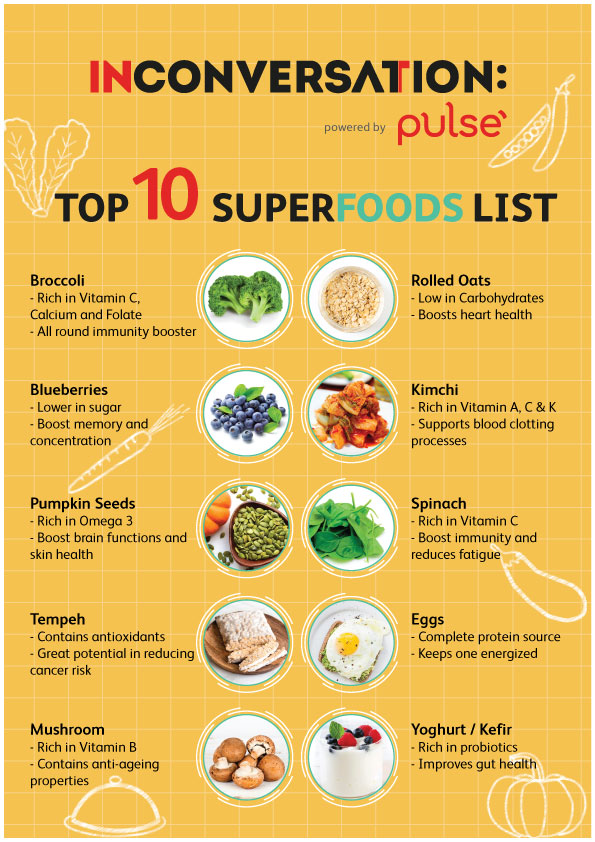Cancer insurance plans are aplenty in the market and it is there to provide additional financial support during an unfortunate cancer diagnosis. Apart from safeguarding against the unforeseen, you can ease your own cancer risk through your diet and lifestyle.
Eating healthier only has upsides and our diet can be the first line of defence against a number of health issues such as cancer – the #1 killer in Singapore1. Every meal is a chance to boost our health, so eat as much fresh food as possible and enjoy a wide selection regularly for maximum benefits.
The 10 superfoods shown here can be easily found in most supermarkets, and are very versatile and affordable ingredients!. Superfoods are usually unprocessed, whole foods that are nutritionally powerful.
Including a handful of these superfoods into your daily meal could do wonders!
1. Broccoli
A real powerhouse, broccoli is low in calories but high in benefits. It’s packed with vitamin C, calcium, folate among other vitamins and is known to be an all-round immunity booster. Broccoli also contains sulforaphane, which has been shown to potentially kill cancer cells.
To really benefit from broccoli, it’s best consumed briefly boiled or steamed and lightly salted.
2. Rolled Oats
Many of us enjoy indulging in local favourites for breakfast, such as carbohydrate-heavy dishes like bee hoon, laksa or prata. Consider swapping those out for rolled oats a few times a week. Fiber is one of oat’s main attributes, which helps slow down digestion so you don’t get hit by that drowsy, “food coma” soon after eating. More than being alert, a diet rich in soluble fibers may help keep colorectal cancer at bay.
Rolled oats, which are lightly processed whole grain oats, can also help with diabetes prevention and lower cholesterol levels.
3. Blueberries
Blueberries are small but mighty. Apart from being shown to boost memory and concentration which is a great snack in between meetings, they are also high in antioxidants. Antioxidants fight free radicals, which are unstable molecules that contribute to a host of health issues including cancers. Low in sugar, they make a perfect snack if you’re watching your sugar intake.
4. Kimchi
While superfoods tend to be whole and unprocessed, kimchi has made the list despite having been “processed” by fermentation, for its many benefits. Typically served as a side dish in Korean meals, it is usually made of Chinese cabbage. The cabbage itself has vitamins A, C and K. The lacto-fermentation process kimchi undergoes creates an environment that encourages friendly bacteria growth. These bacterias, such as probiotics, promote gut health and lower the risks of developing bladder and colorectal cancers.
5. Pumpkin Seeds
For all they offer, pumpkin seeds are a really underrated superfood. Just a handful will deliver a boost of omega-3 fatty acids which boost brain functions and skin health. Pumpkin seeds require zero prep time to enjoy. Pop them as is or toss them into a salad to start enjoying their benefits immediately.
6. Spinach
Spinach has long been widely known as a nutrient dense vegetable but not many of us know just one leaf contains over half of our daily requirement of vitamin K1, essential for blood clotting.
Spinach is also chock full of beta-carotene and lutein, antioxidants that work to slow cancer cell growth. These greens are also rich in vitamin C which boosts immunity and reduces fatigue.
7. Tempeh
A traditional Indonesian staple, tempeh is made from fermented soybeans. Popular among vegetarians and vegans as a great source of plant protein, it can be used as a meat replacement for people looking to gradually reduce meat consumption. The antioxidants in the soy help combat free radicals, which go a long way in reducing cancer risk.
8. Eggs
Eggs need no introduction for the health benefits they contain. One of the cheapest and most available superfoods, eggs are considered a complete protein source. This superstar food delivers doses of selenium too, a powerful antioxidant that fights free radicals, supports both metabolism and thyroid functions and helps reduce heart disease.
9. Mushrooms
Mushrooms may not always come to mind when talking about superfoods but they are hardworking fungi. They are rich in the B group of vitamins: niacin, riboflavin and pantothenic acid and this trio generally boosts heart health. The antioxidants present in mushrooms go against free radicals and also have the helpful benefit of anti-aging properties.
10. Yogurt/Kefir
Most of us may be familiar with yogurt more than kefir. Kefir is a fermented drink made with adding kefir grains to either cow’s milk or goat’s milk.
While yogurt and kefir are widely known to be a great source of probiotics, kefir is actually a richer source of the bacterias and yeasts that make up the probiotics. Probiotics are essential to gut health, which in turn affect our immune system and skin. Very importantly, the maintenance of gut health can also help reduce the risk of colon cancer.
Learn from nutritionists Meenushree Chandrasekaran and Fiona Chia on the types of superfoods that you may help lower your cancer risk.
Download the top 10 superfoods for your next grocery run here!

Join us in the next In Conversation series:
In Conversation is a series powered by Pulse by Prudential, that aims to bring together a community of speakers and thought leaders to share ideas and knowledge to live well.
Come join this conversation with us at https://www.miceneurol.com/prudential-inconversation.
Embark on your wellness journey with Pulse. Click here for more information on the app features.
1Source: National Registry of Diseases Office, Singapore Cancer Registry, Singapore Cancer Registry 50th Anniversary Monograph (1968 – 2017). https://www.nrdo.gov.sg/publications/cancer; https://www.nrdo.gov.sg/docs/librariesprovider3/default-document-library/thespore-cancerregistry_commerativebook_-1.pdf?sfvrsn=231fce6e_0
Disclaimer:
This article is for your information only and does not consider your specific investment objectives, financial situation or needs. We recommend that you seek advice from a Prudential Financial Consultant before making a commitment to purchase a policy.

